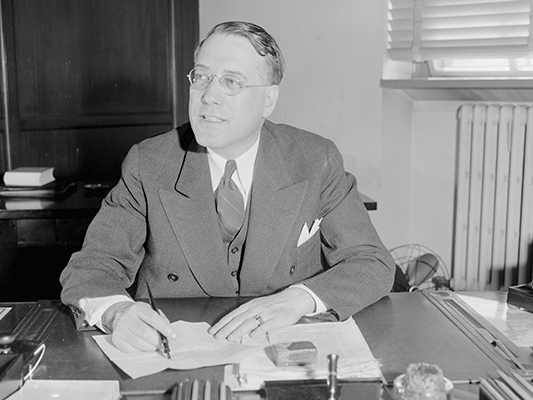Elmer Irey

Born: March 10, 1888, Kansas City, Missouri
Died: July 19, 1948, Washington, D.C.
Nicknames: Uncle Elmer
Associations: Al Capone, Treasury Department, President Herbert Hoover, President Franklin Roosevelt, Charles Lindbergh
When Life magazine called Elmer Irey “one of the world’s greatest detectives” in September 1946, it was acknowledgement of one of the most important careers in the history of American law enforcement. Irey’s effectiveness in putting Prohibition-era Mob bosses behind bars surpasses that of all others, including contemporaries such as J. Edgar Hoover and Eliot Ness in the federal government.
Nicknamed “Uncle” Elmer by the mobsters who feared him, Irey led the Intelligence Unit at the Treasury Department that used the income tax codes to send a generation of high-profile organized crime leaders to prison. The list of successful prosecutions reads like a “who’s who” of mobsters and scoundrels in the often intersecting worlds of crime, business and politics: New York bootlegger Waxey Gordon, Atlantic City political boss Enoch “Nucky” Johnson, race wire owner Moses Annenberg, Chicago gangster Johnny Torrio and his protégé, Al Capone.
Irey and his agents also played a critical role in the capture and prosecution of Bruno Hauptmann, convicted of the kidnapping and murder of aviator Charles Lindbergh’s son in a case then considered “the crime of the century.”
Unlike J. Edgar Hoover’s G-Men, Irey’s T-Men received modest media attention. While Hoover and his FBI agents were popularized as machine-gun-toting crime crusaders, Irey cultivated a subdued and humble public persona for himself and his agents. Their success was due to diligent and methodical investigation, not photo-friendly gunplay.
Despite the hype, it was Irey’s men, not Hoover’s, who brought down the leaders of the Mob and bootleggers from the 1920s through the 1940s, and it was Irey and his agents who documented the national reach of organized crime syndicates.
Irey was a dogged investigator, but his greatest strength was in choosing good people with whom to work. His colleagues Frank Wilson and undercover agent Mike Malone were notable for their successes in investigating, compiling and documenting the tax evasions of men such as Capone and Gordon.
Irey served for more than 25 years in the Treasury Department, rising from a postal inspector under President Calvin Coolidge to, in 1937, the overall coordinator of the Treasury Department’s law enforcement agencies, including the Secret Service, the Internal Revenue Service’s Intelligence Unit, the U.S. Customs Service, the predecessors to the Drug Enforcement Agency and the Bureau of Alcohol, Tobacco and Firearms, and the U.S. Coast Guard. He held that position until his retirement in 1946. Along the way, he won the thanks and accolades of many, including President Franklin D. Roosevelt and Treasury Secretary Henry Morganthau Jr.
Irey’s descendants donated a large collection of documents and other artifacts from Irey’s career to The Mob Museum in 2013. Visitors can see documents, photographs and other items on display at the Museum.




